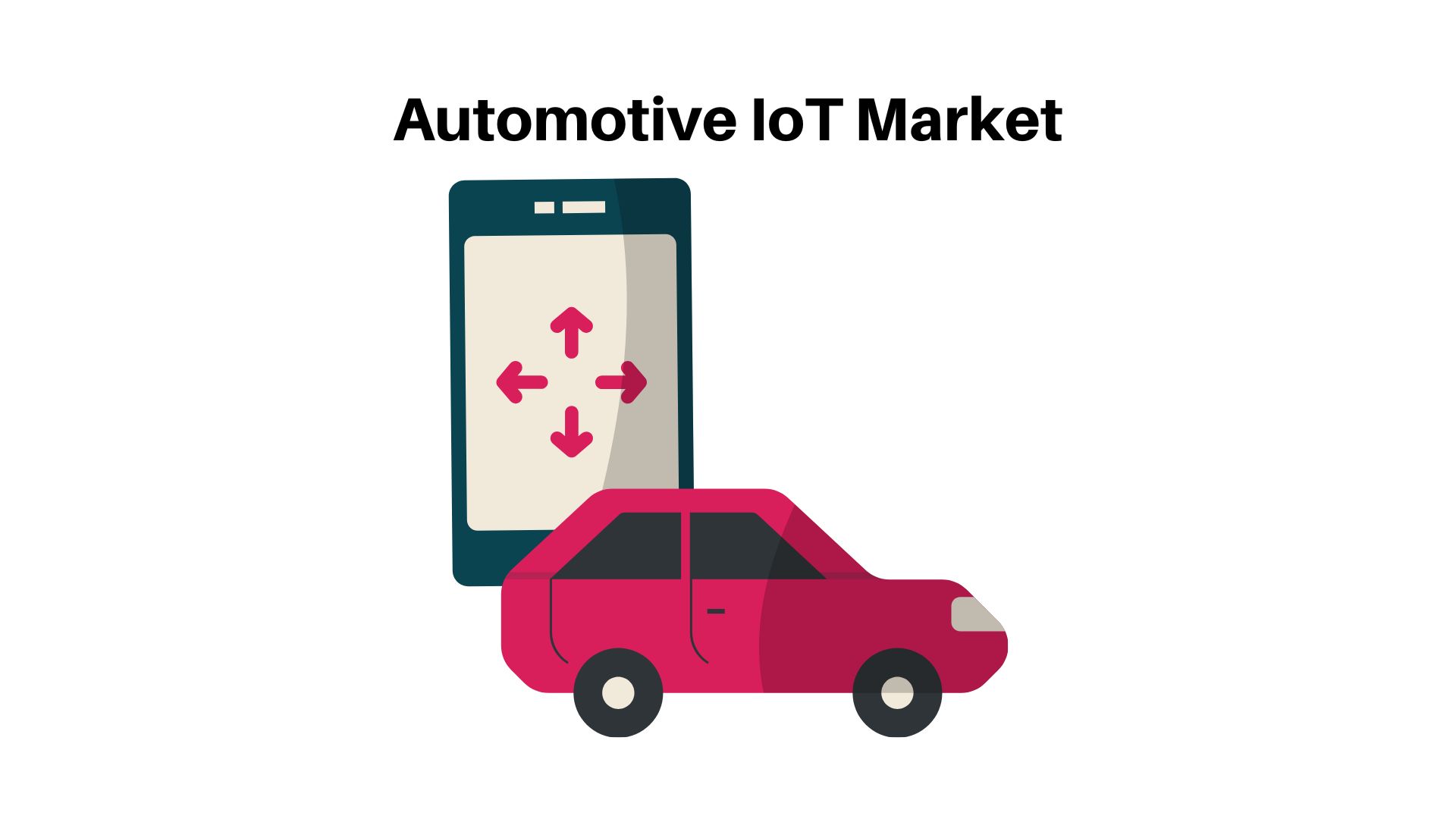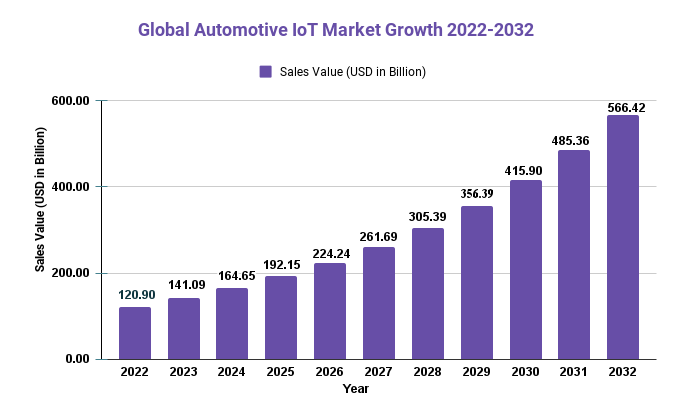Automotive IoT Market Will Reach USD 566.42 billion by 2032

Page Contents
Market Overview
Published Via 11Press: The global automotive IoT market will reach USD 566.42 billion by 2032. It is projected to grow at 16.7% CAGR during the forecast period of 2022-2032.
Automotive IoT is the market for the integration of Internet of Things technology in the automotive sector. This technology is used for vehicle safety, efficiency, and comfort as well as to enhance the overall driving experience.
The growing demand for connected cars, the growth of in-vehicle infotainment systems, and the growing need to have real-time vehicle data and traffic data are all contributing to market growth.
The report suggests that North America will be the region with the highest market share for the forecast period. Europe is second and the Asia Pacific third. The presence of key players in North America and the adoption of advanced technologies in automotive manufacturing are driving the growth of the North American region.
Request For Sample Report Here: https://market.us/report/automotive-iot-market/request-sample

Regional Snapshot
- North America: North America is projected to hold a major share of the Automotive IoT market due to the rising adoption of connected cars and advanced technologies like ADAS and autonomous driving. Furthermore, major Automotive IoT solution providers like Cisco Systems, Inc., IBM Corporation, and Microsoft Corporation are fueling this growth within this region.
- Europe: Europe is a key region in the Automotive IoT market, with countries like Germany and the United Kingdom leading the charge. Here, there's high adoption of advanced driver-assistance systems (ADAS) and infotainment systems which are fueling its growth.
- Asia Pacific: The Asia Pacific region is expected to experience rapid growth in the Automotive IoT market due to the rising uptake of connected cars and smart transportation systems. Countries like China and Japan are major players in this space due to their focus on smart city initiatives and investments in IoT technologies.
- Middle East and Africa: The Middle East and Africa region has been slow in adopting Automotive IoT technologies due to a lack of infrastructure and limited investments in this space. However, expectations are that growth will accelerate over the coming years with increased demand for connected cars and advanced driver-assistance systems.
- Latin America: Latin America is projected to experience moderate growth in the Automotive IoT market due to a slow adoption rate for these technologies. Nonetheless, investments in IoT technologies are on the rise in this region, which should stimulate market expansion over the coming years.
Market Dynamics
Drivers
- IoT Technology Advancements: Rapid advancements in IoT technology such as sensors, connectivity solutions and cloud computing are driving the growth in the Automotive IoT market. IoT technology adoption is fueled by the growing demand for connected cars and intelligent transportation systems.
- The Automotive IoT Market is expanding due to rising safety and security concerns. IoT technologies are being employed in creating advanced driver assistance systems (ADAS) designed to reduce accidents and enhance driver safety.
- Government Initiatives: Governments around the world invest in smart city initiatives and promote the adoption and use of connected cars and other advanced transportation systems, which is fueling growth in the Automotive IoT Market as these technologies allow for improved and more efficient transport solutions.
- IoT technologies in the automotive sector are growing in popularity as efficiency has become a greater focus. IoT solutions that use less energy are now making hybrid and electric vehicles eco-friendly.
Restraints
- Data Privacy and Security Issues: As connected cars generate more data, data privacy and security are becoming increasingly important issues for automotive IoT market players. They face an increased risk of cyber-attacks and breaches due to the increasing amount of sensitive information.
- Lack of Standardization: Lacking standardization in the IoT industry poses a major obstacle for those involved in Automotive IoT projects. Without common communication protocols and data formats, interoperability between devices and systems may suffer significantly due to this issue.
- High Implementation Cost: The high implementation costs associated with IoT technologies is a major obstacle for the Automotive IoT market. Companies may find sensors, connectivity solutions, and cloud computing too costly for some to justify the investment.
- Limited Network Coverage: Lacking reliable network coverage in some regions is a challenge for the Automotive IoT market. In these regions, inadequate connectivity or lack of coverage may impede the performance of IoT devices and systems.
- Slow Adoption in Developing Countries: The slow adoption of IoT technologies in developing countries is a major impediment to the growth of the Automotive IoT market. Lack of infrastructure and limited resources can hinder the implementation of these solutions in these regions.
Opportunities
- Advancements in 5G Technology: The development of 5G technology presents exciting prospects for the Automotive IoT Industry. 5G networks offer faster and more dependable connectivity, which can enhance IoT devices and systems' performance.
- Growing Demand for Connected and Autonomous Cars: The growing demand for connected and autonomous cars presents an immense opportunity in the Automotive IoT market. IoT technologies can enable advanced driver-assistance systems (ADAS), enhancing driving comfort for passengers.
- Emerging Markets: Emerging markets such as India and China offer significant prospects for the Automotive IoT market. These countries boast a large population and expanding middle class, which are driving demand for connected cars and smart transportation systems.
- Integration with Artificial Intelligence (AI): The integration of IoT technologies and artificial intelligence (AI) presents significant opportunities for the Automotive IoT Industry. AI can enable advanced analytics and predictive maintenance, which in turn enhances performance and reliability for connected devices and systems.
- Development of Electric and Hybrid Vehicles: The growth in electric and hybrid vehicles presents significant opportunities for the Automotive IoT market. By using IoT technologies, energy management can be improved while hybrid and electric cars perform better overall.
View Detailed TOC of the Report | https://market.us/report/automotive-iot-market/table-of-content/
Challenges
- Data Privacy and Security Concerns: The Automotive IoT Industry collects and generates a vast amount of data, raising serious privacy and security issues. Furthermore, the risk of cyber-attacks or data breaches poses an immense challenge to this rapidly developing sector.
- Lack of Standardization: Lacking standardization in the IoT industry poses a significant obstacle for businesses operating in the Automotive IoT space. Without common communication protocols and data formats, interoperability between devices and systems may suffer significantly as a result.
- High Implementation Cost: The high implementation costs associated with IoT technologies pose a major obstacle for the Automotive IoT market. Sensors, connectivity solutions, and cloud computing can prove prohibitively expensive for some companies.
- Limited Network Coverage: Limited network coverage can pose a challenge to the Automotive IoT Industry. In certain regions, lack of connectivity or poor reception may negatively impact the performance of IoT devices and systems.
- Regulatory Obstacles: The Automotive IoT Industry faces numerous regulatory obstacles, such as compliance with data protection laws and regulations. Furthermore, the lack of clarity in regulations and policies makes it difficult for companies to navigate the regulatory landscape efficiently.
- Consumer Acceptance: Adopting new IoT technologies by consumers can present a major challenge for the Automotive IoT Industry. Concerns over data privacy, security, and dependability may hinder some individuals from adopting these innovations.
- Limited Talent Pool: The Automotive IoT market faces a shortage of skilled professionals with expertise in IoT technologies, making it difficult for companies to develop and implement effective solutions.
Key Market Segments
Type
- Hardware
- Software
- Services
Application
- Navigation
- Telematics
- Infotainment
- Other
Key Market Players
- Google (US)
- Apple (US)
- OnStar (US)
- Cisco Systems (US)
- Microsoft (US)
- Intel Corporation (US)
- IBM Corporation (US)
- Robert Bosch (Germany)
- AutoNavi (China)
- NAVINFO (China)
- QiMing Information Technology (China)
- Anhui Wantong Technology (China)
Report Scope
| Report Attribute | Details |
| The market size value in 2022 | USD 120.9 Bn |
| Revenue forecast by 2032 | USD 566.42 Bn |
| Growth Rate | CAGR Of 16.7% |
| Regions Covered | North America, Europe, Asia Pacific, Latin America, and Middle East & Africa, and Rest of the World |
| Historical Years | 2017-2022 |
| Base Year | 2022 |
| Estimated Year | 2023 |
| Short-Term Projection Year | 2028 |
| Long-Term Projected Year | 2032 |
Frequently Asked Question
Q: What is the current market size for the Automotive IoT Market?
A: According to a report by Market.us, the Automotive IoT Market was valued at USD 120.9 billion in 2022 and is expected to reach USD 566.42 billion by 2032, growing at a CAGR of 16.7% during the forecast period.
Q: What are the key segments of the Automotive IoT Market?
A: The Automotive IoT industry can be segmented based on Type (Hardware, Software, Services), By Application (Navigation, Telematics, Infotainment, Other), and geography (North America, Europe, Asia-Pacific, Latin America, and Middle East & Africa).
Q: Who are the key players in the Automotive IoT Market?
A: Some of the key players in the Automotive IoT industry include Google (US), Apple (US), OnStar (US), Cisco Systems (US), Microsoft (US), Intel Corporation (US), IBM Corporation (US), Robert Bosch (Germany), AutoNavi (China), NAVINFO (China), QiMing Information Technology (China), Anhui Wantong Technology (China).
The team behind market.us, marketresearch.biz, market.biz and more. Our purpose is to keep our customers ahead of the game with regard to the markets. They may fluctuate up or down, but we will help you to stay ahead of the curve in these market fluctuations. Our consistent growth and ability to deliver in-depth analyses and market insight has engaged genuine market players. They have faith in us to offer the data and information they require to make balanced and decisive marketing decisions.



